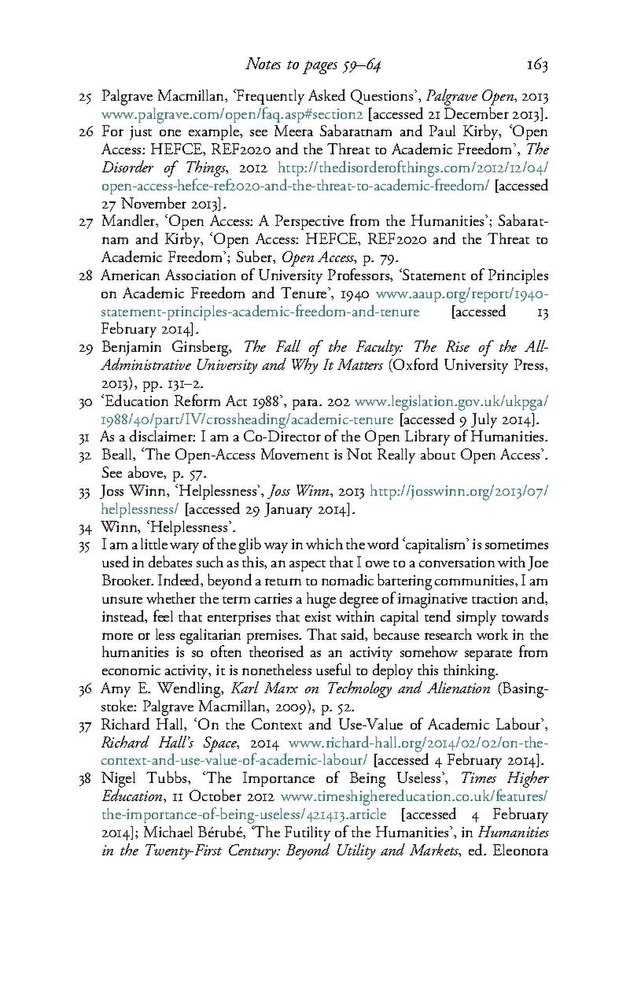25 Palgrave Macmillan, ‘Frequently Asked Questions’, Palgrave Open, 2013 www.palgrave.com/open/faq.asp#section2 [accessed 21 December 2013].
26 For just one example, see Meera Sabaratnam and Paul Kirby, ‘Open Access: HEFCE, REF2020 and the Threat to Academic Freedom’, The Disorder of Things, 2012 http://thedisorderofthings.com/2012/12/04/open-access-hefce-ref2020-and-the-threat-to-academic-freedom/ [accessed 27 November 2013].
27 Mandler, ‘Open Access: A Perspective from the Humanities’; Sabaratnam and Kirby, ‘Open Access: HEFCE, REF2020 and the Threat to Academic Freedom’; Suber, Open Access, p. 79.
28 American Association of University Professors, ‘Statement of Principles on Academic Freedom and Tenure’, 1940 www.aaup.org/report/1940statement-principles-academic-freedom-and-tenure [accessed 13 February 2014].
29 Benjamin Ginsberg, The Fall of the Faculty: The Rise of the All-Administrative University and Why It Matters (Oxford University Press, 2013), pp. 131–2.
30 ‘Education Reform Act 1988’, para. 202 www.legislation.gov.uk/ukpga/1988/40/part/IV/crossheading/academic-tenure [accessed 9 July 2014].
31 As a disclaimer: I am a Co-Director of the Open Library of Humanities.
32 Beall, ‘The Open-Access Movement is Not Really about Open Access’. See above, p. 57.
33 Joss Winn, ‘Helplessness’, Joss Winn, 2013 http://josswinn.org/2013/07/helplessness/ [accessed 29 January 2014].
34 Winn, ‘Helplessness’.
35 I am a little wary of the glib way in which the word ‘capitalism’ is sometimes used in debates such as this, an aspect that I owe to a conversation with Joe Brooker. Indeed, beyond a return to nomadic bartering communities, I am unsure whether the term carries a huge degree of imaginative traction and, instead, feel that enterprises that exist within capital tend simply towards more or less egalitarian premises. That said, because research work in the humanities is so often theorised as an activity somehow separate from economic activity, it is nonetheless useful to deploy this thinking.
36 Amy E. Wendling, Karl Marx on Technology and Alienation (Basingstoke: Palgrave Macmillan, 2009), p. 52.
37 Richard Hall, ‘On the Context and Use-Value of Academic Labour’, Richard Hall’s Space, 2014 www.richard-hall.org/2014/02/02/on-the-context-and-use-value-of-academic-labour/ [accessed 4 February 2014].
38 Nigel Tubbs, ‘The Importance of Being Useless’, Times Higher Education, 11 October 2012 www.timeshighereducation.co.uk/features/the-importance-of-being-useless/421413.article [accessed 4 February 2014]; Michael Bérubé, ‘The Futility of the Humanities’, in Humanities in the Twenty-First Century: Beyond Utility and Markets, ed. Eleonora
